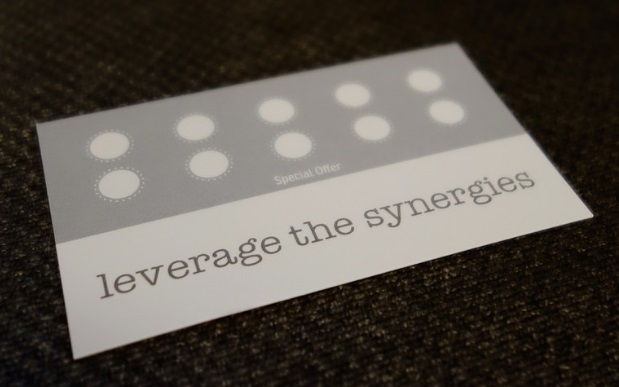 If you’ve been working from home more often after Covid, you might have missed some aspects of office life (or maybe not). One element that most people won’t have missed is the office jargon of business meetings. In fact, a new study has revealed that office jargon is one of the most hated aspects of going to work!
If you’ve been working from home more often after Covid, you might have missed some aspects of office life (or maybe not). One element that most people won’t have missed is the office jargon of business meetings. In fact, a new study has revealed that office jargon is one of the most hated aspects of going to work!
Business talk or office jargon includes those irritating phrases that regularly crop up at work. Many people secretly dislike corporate jargon but it continues to be used in many offices. From ‘thinking outside the box’ to ‘touching base’ and ‘leveraging synergies’ – it’s hard to avoid in most offices. So let’s employ some blue-sky thinking going forward, as we unpack the most common office jargon!
Sports-Related Office Jargon
A new study by the jobs website Glassdoor has revealed that office jargon makes our working lives feel more complicated and irritating. On revealing some of our most hated office jargon, the worst offender in the list is the phrase ‘touch base’.
In business-talk, to ‘touch base’ means to meet up to discuss an issue. This phrase comes from the sports field with baseball players touching base to remain in the game.
There are many phrases that people use in business meetings or in the office generally. Sometimes the same phrases are also used in daily life, but they can make the person sound pretentious.
Many of the office jargon we hear come from the world of sport. The phrases usually originate in the USA, which explains why they are often related to American sports.

Much office jargon comes from the world of sport – image source
Some other sport-related office jargon and idioms include:
to be ‘on the ball’ – to be up to speed with a subject (knowledgeable about the current issue)
to ‘drop the ball’ – to lose focus and make a mistake
‘the balls in your court’ – the decision / next move is yours
‘game changer’ – an idea that creates a significant change. This new idea can completely change the ‘game’ (i.e. the business venture).
‘close of play’ – the end of the day. You could be asked to finish something ‘by close of play’ tonight. Sometimes this is abbreviated to COP in an email.
‘going forward’ – in the future / from now on.
Connecting Work and Leisure
All these sport-related phrases make us wonder why business-talk has become so inter-connected with sports?
One reason could be people trying to make their business world seem more exciting. Connecting work with sports makes it feel as though you are connecting your working day with your leisure time and playing games.
This could be a clever way for mangers to keep workers enjoying their working day by psychologically connecting it with having fun!
However, this recent study on office jargon by Glassdoor suggests that it is having quite the opposite effect – people are getting fed up with this trite office jargon.
Blue-Sky Thinking and Brain Storms
The second-most hated piece of corporate jargon is ‘blue-sky thinking’. This phrase means thinking creatively and without limits – your imagination should reach up to the sky.
Blue-sky thinking is often called for in meetings during a brain-storming session. In fact, ‘brain storm’ is actually another phrase on the list of hated office jargon.
To ‘brain storm’ means to think creatively and without boundaries or to use another idiom, ‘outside the box’.
When you think ‘outside the box’ you are thinking beyond the normal accepted range of ideas. You are being creative in your thought processes, you are going rogue – being a bit of a maverick. A ‘maverick’ means a person who breaks the rules and is unpredictable.
Companies sometimes have a ‘thought shower’ instead of a ‘brain storm’ out of fear of offending people with epilepsy. These phrases mean the same thing – thinking creatively, coming up with new ideas and unleashing the imagination.
If you do come up with a new idea, let’s hope it ‘has legs’ – i.e. is a good idea that has lasting appeal. To make it work, you all need to be ‘singing from the same hymn sheet’ – pulling in the same direction and thinking alike.
When telling someone about your new idea, you can give them a ‘heads up’. This phrase originates from the military, where when something dangerous was about to happen, everyone was asked to move their ‘heads up’ to see what was happening.
If they don’t like your idea, they might want to ‘get off the bus‘, which simply means to leave. It could refer to someone leaving a thought process, a meeting or more usually a job. For example: ‘if you don’t like it, get off the bus’.
If you want to extend the limits of what seems possible and go further than the norm, you are ‘pushing the envelope’.
But if you push the envelope too far, the company might have to ‘let you go’, which is a gentler way of telling you that you are fired or have been made redundant!
We’re All Going on a Journey
In business, everyone is going ‘on a journey’ instead of continuing with a business plan that hasn’t reached its objective yet. Again this makes it sound more exciting – like an travelling adventure!
Likewise, if there is an important moment in the journey, it is ‘key’. This makes it feel as though you are opening the door to something spectacular. That is a ‘key’ part of the process. For example, if you want to understand more about business jargon, this article is key!
That this article is key is a ‘no-brainer’ – i.e. obvious. This jargon comes from sport where a physical action is so well-drilled that it doesn’t need any thought. If a business plan is a ‘no-brainer’ it requires no consideration – it is clear immediately.
Is a ‘no brainer’ an irritating expression? The answer to that question is certainly a no-brainer for us… But if you are still considering the question, it means you are ‘running it up the flagpole’. The means you are testing the popularity of an idea.
The idea can also be ‘on my radar’ – i.e. I am aware of it.
Leveraging the Synergies
Leverage and synergy are two of the most over-used pieces of office jargon that always manage to find their way into language used in business meetings.
After running an idea ‘up the flagpole’, you might decide to ‘leverage’ it. If you want to ‘leverage’ something, it simply means you want to use or take advantage of it and use it to create something fantastic.
However, you might need to ‘upskill’ in order to leverage the idea. Beware though that to ‘upskill’ simply means you need to take on more work (use more skills) – usually without receiving any more money!
Another word often found in the same conversation as ‘leverage’ is ‘synergy’. Many business people talk about ‘leveraging their synergies’ to the grimaces of the audience. In a business context, ‘synergy’ just means working together.
So to ‘leverage a synergy’ simply means taking advantage of two things that work well together.
Let’s Workshop a New Vertical
However, if you are a company who is upskilling, you might be adding a new ‘vertical’. A ‘vertical’ is simply an area of expertise or an industry.
So if you serve the technology vertical or your main vertical is technology, you create products or offer a service that is intended for the technology industry. Want to make it simple? Just replace the word ‘vertical’ with ‘market’ and you have the same thing.
Unsure if an idea or new vertical will work for your company? You may want to ‘workshop’ it first. This simply means to explore all the stages of the idea/product before it is launched officially.
Phew! We have finally ‘unpacked’ the meaning of vertical, upskill and workshop. By the way, to ‘unpack’ something means to examine it closely.
Perhaps the most unpleasant piece of business jargon is to ‘punch a puppy’, which refers to the need to make an unpopular decision or do something bad for the benefit of the company or for the greater good. This unsavoury phrase seems to be most commonly used in the banking sector.
After all of this, don’t forget to schedule your ‘annual leave’ – or you might want to just take a holiday!
Why do People Use Jargon?
One of the attractions of office jargon is that it is so generalised. When people use these phrases, they are unspecific. This means that anyone can use them – even if they don’t know what they’re talking about.
Business jargon therefore creates a veil to hide behind. The strange language can hide the fact that nothing has really been said – the ‘emperor’s new clothes‘ effect…
The person using the jargon phrase might not understand it. Jargon can also be used to make something bad sound better – or even good.
For example, when a company says they are ‘going on a journey‘ and ‘leveraging‘ a more ‘stream-lined‘ approach, it could mean they are is making lots of redundancies. It might also mean the remaining staff will need to ‘upskill‘.
In other words, remaining workers will have to take on more responsibility and a greater workload – probably for the same salary.
Finally, using jargon makes people feel they belong. When everyone uses the same phrases it creates a sense of belonging – even if they all know secretly that the jargon is meaningless.
The corporate world has its own language and this is something that irritates and confuses many English language speakers. For speakers of English as a foreign language, it is even harder to get to grips with the nonsense of the corporate dictionary.
Office jargon is something EFL students will have to navigate if they want to understand business meetings in an English-speaking country. Or alternatively, simply ask people to talk in regular English instead of business jargon!
What do you think about office jargon?
Can you think of any more typical business phrases?
Which is your most hated piece of office jargon?
Have you heard any office jargon that you didn’t understand? Have you used jargon yourself without understanding it?
Have you experienced any funny incidents related to language at work or the use of business jargon?
Has the Coronavirus pandemic caused you to work remotely more often? And if so, have you missed office life – or have you enjoyed working from home?
Share your thoughts in the comments!
Attributions
- Jargon, buzzwords and meaningless expressions by Gavin Llewellyn via Flickr [CC BY 2.0]
- Never Think Outside the Box by MK Feeny via Flickr [CC BY 2.0]
- Leverage the Synergies Loyalty Card by interestedbystandr via Flickr [CC BY 2.0]





